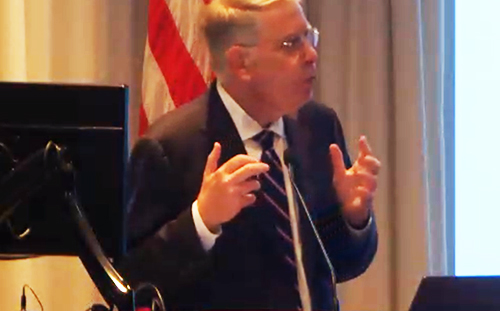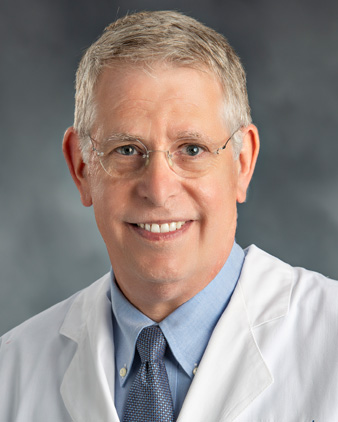
Medicine continues evolving rapidly, and its future is full of promise, but physicians must stay true to their longstanding and traditional covenant with society.
That’s according to Leslie Rocher, M.D., a professor of Internal Medicine at OUWB, who previously served as senior vice president and Chief Medical Officer of Beaumont Hospital, Royal Oak.
On Wednesday, Rocher presented the 2021 William Davidson Lecture during Oakland University William Beaumont School of Medicine’s Medical Education Week. About 160 people attended.
Rocher’s presentation was titled “Considerations Regarding the Future of Medicine.” He framed it around knowledge and discovery, a changing world, and medicine’s covenant with society, which is centered on “its important role in sustaining our mission.”
Rocher made perfect sense for the lecture, said Sandor H. Shoichet, M.D., program director, Internal Medicine Residency and medical director of Outpatient Clinics at Beaumont Hospital, Royal Oak, and associate professor of Internal Medicine at OUWB.
“Dr. Rocher was an ideal choice because of his outstanding career at Beaumont in medical education and leadership, and because of his steadfast adherence to the values embodied in OUWB,” said Shoichet, who co-chairs Medical Education Week.
‘We must adapt wisely’
Rocher |
“Knowledge and discovery can transform the way we work and improve future health care outcomes,” said Rocher, who added “we must adapt wisely to a changing world in order to move our mission forward.”
In addressing how quickly things can change, Rocher noted Moore’s Law, which “describes the empirical regularity that the number of transistors on integrated circuits doubles approximately every two years.”
As such, speed and costs of electronics concurrently rise and with that, increased use of technologies like artificial intelligence (AI) in medicine.
“Artificial intelligence systems can identify a myriad of abnormalities, on any type of image, and categorize with accuracy, subtle changes not readily apparent to the human eye,” said Rocher.
Rocher also talked about the use of technology in gene sequencing and genomics. He noted that it’s the kind of work that has led to development of COVID-19 vaccines and has potential for other applications, such as sickle cell anemia.
“AI, and an emerging deeper understanding of the human genome, will be among the major forces transforming medicine,” he said.
Such developments generally apply to what Rocher identified as the “changing world” of medicine. As an example, Rocher pointed to a projected decline in traditional clinical patient visits, due in part to increased use of health monitoring devices, like Apple Watch and Fitbit, and accelerated use of telemedicine as a result of COVID-19.
He also noted that COVID-19 has served to accelerate the movement of care out of hospitals, when possible, and into homes, and centers dedicated to surgery, diagnostics, urgent care, and more.
It’s the kind of evolution of medicine that could lead to many improvements in the field, he said, including reduced waste in spending.
“It’s not just where we practice medicine that will change,” he said. “It’s how we practice that will continue to transform.”
The importance of caring
Rocher also noted the importance of medicine’s longstanding covenant with society that primarily focuses on putting each patient’s interest above the physician’s, and maintaining competence in all work.
He did note the challenges medicinal professionals face in adherence to that covenant — challenges, he said, posed in large part by a health care system that can over complicate matters and contribute to diminished trust on the part of patients and “depersonalize” the overall experience.
Still, Rocher said the best way for physicians to battle those forces tearing at the fabric of the covenant comes down to one word: caring.
“Caring commands that we, as physicians, be conscientious in our responsibility to sustain wellness, to make the right diagnosis during illness, to offer the best treatment options, and to communicate well,” he said. “Because it provides the foundation for keeping the patient’s interest foremost, caring is essential to preserving the profession’s covenant with society.”
Shoichet said such insights offered by Rocher during his presentation were why it was so effective.
“Dr. Rocher’s presentation was a wonderful blend of historical context, futuristic possibilities, and a reminder of the need for continued commitment to the highest ideals of the medical profession,” he said.
For more information, contact Andrew Dietderich, marketing writer, OUWB, at [email protected].
To request an interview, visit the OUWB Communications & Marketing webpage.
NOTICE: Except where otherwise noted, all articles are published under a Creative Commons Attribution 3.0 license. You are free to copy, distribute, adapt, transmit, or make commercial use of this work as long as you attribute Oakland University William Beaumont School of Medicine as the original creator and include a link to this article.


